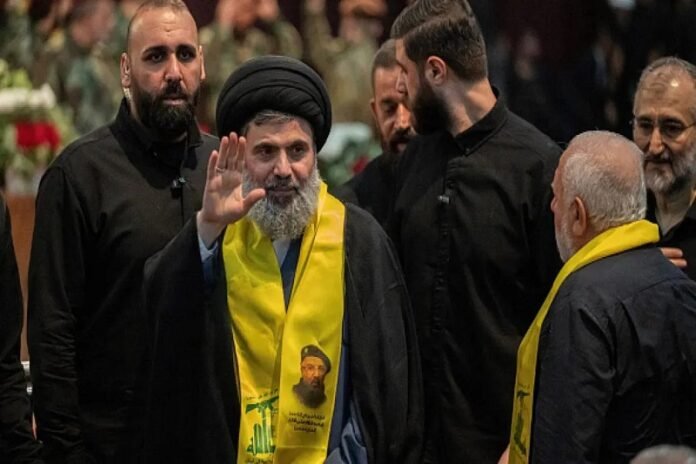Amid the strategic changes taking place in Hezbollah following the assassination of its former Secretary-General, Hassan Nasrallah, Hashem Safi Al-Din, the head of the party’s Executive Council, has emerged as a potential successor to lead the organization.
These changes come amid increasing regional tensions and international pressure on Lebanon and Hezbollah. Despite the limited information available about Safi Al-Din, he is known for holding important positions within the party since its founding in 1982, being one of the influential figures in the internal structure of Hezbollah.
The Rise of Hashem Safi Al-Din: A Continuation of Nasrallah’s Path?
It is known that Safi Al-Din received his religious education in the Iranian city of Qom during the 1980s, where he accompanied his cousin Hassan Nasrallah, reflecting his deep roots in Hezbollah’s religious and political system. Upon returning to Lebanon, he assumed leadership positions, including the presidency of the party’s Executive Council, a role that is practically equivalent to the “Prime Minister” within the party structure.
But the question arises: Does Safi Al-Din’s rise represent a continuation of Nasrallah’s approach, or will it signal a shift toward more extreme tendencies? According to Israeli sources, Safi Al-Din is seen as more radical than Nasrallah, a claim that raises questions about the future of regional relations with Lebanon and Hezbollah’s role in future confrontations.
Continuity or Leadership Change?
Over the past three decades, Safi Al-Din has handled the party’s daily responsibilities, from managing its investments to organizing its internal affairs, while Nasrallah focused on major strategic files. This makes him a natural choice to lead the party in the post-Nasrallah era, especially as he is known for his ability to mobilize popular support and deliver powerful religious speeches.
The crucial question remains: How will Safi Al-Din’s leadership reflect on Hezbollah’s strategic shifts? Will we see a change in the party’s policies towards Israel, or will Safi Al-Din maintain the same approach? His recent speeches suggest a firm stance against Israel, where he stated in July 2024 that Hezbollah is ready to sacrifice everything in the face of the “Israeli enemy.” Does this signal an impending escalation in the conflict?
International and Regional Pressures: Will They Affect the Party’s Path?
Amid increasing international pressure on Hezbollah, especially with Israel’s intensified military operations against supply lines between Syria and Lebanon, the question remains: How will Safi Al-Din face these challenges? Israel claims to be preventing weapons smuggling to the party via Syria and Iran, and it may carry out military operations along the border to prevent Hezbollah forces from infiltrating or launching rockets at settlements.
In this context, will Safi Al-Din be able to maintain the party’s balance amid these pressures, or will the rapid developments force the party to make concessions? How will these changes impact Hezbollah’s relations with Iran, the party’s main backer?
Leadership Transition: What Does the Future Hold?
The selection of Hashem Safi Al-Din was not a surprising decision, as his name has been raised for more than 15 years as a potential successor to Nasrallah, especially after assuming prominent positions within the party. Reports suggest that Iran had determined Safi Al-Din’s fate in Hezbollah’s leadership since 1994, reflecting the man’s importance in the party’s political and military landscape.
The central question is: Can Safi Al-Din balance the ongoing conflict with Israel while maintaining the party’s interests in Lebanon, or will internal and external challenges push him to adopt more radical policies? Could this represent a turning point in Hezbollah’s trajectory, especially amidst increasing tensions in the region?
Conclusion: A New Path or Continuity?
Hashem Safi Al-Din’s rise within Hezbollah raises numerous questions about the future of the party and its role in the region. Amid the increasing pressure from Israel and internal challenges in Lebanon, this phase could be decisive in determining Hezbollah’s next steps.
Will Safi Al-Din be able to manage these challenges efficiently, or are we witnessing a new escalation in the Israeli-Lebanese conflict?


